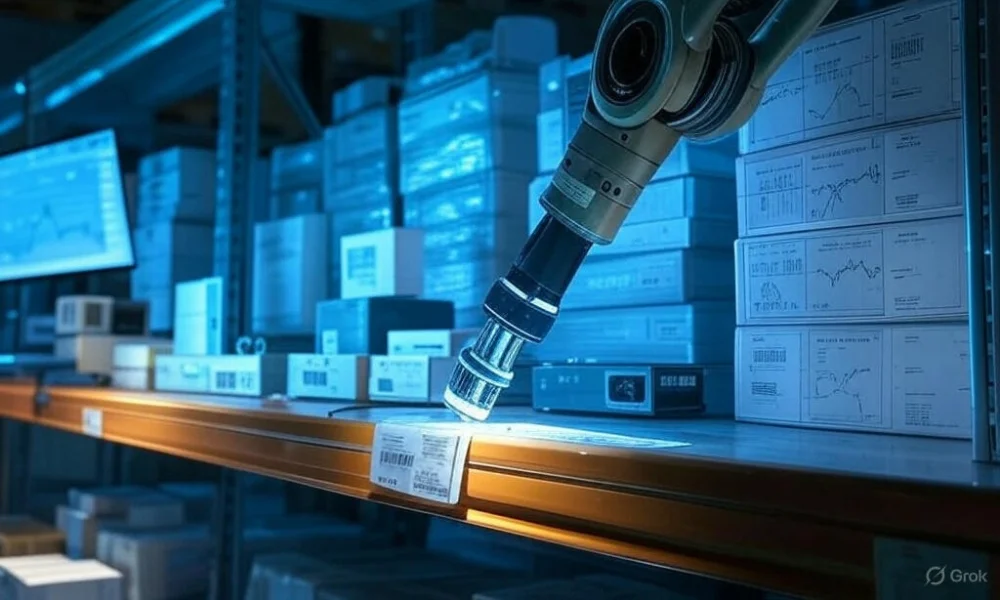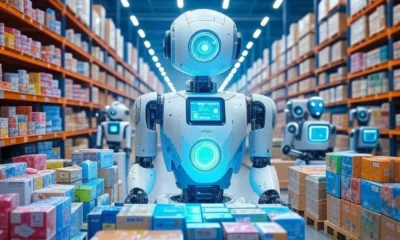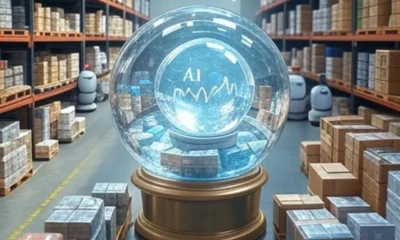Artificial Intelligence
Can AI Eliminate Human Errors in Inventory Management?
AI inventory management transforms businesses by reducing human errors and optimizing stock accuracy with real-time tracking and predictive analytics. This technology minimizes costly mistakes like data entry errors and stock miscounts, ensuring smoother operations and higher customer satisfaction. Discover how AI-driven tools streamline supply chains and cut waste in this detailed guide.

I understand the negative impact that inventory errors have on business operations. Problems with inventory control make companies lose money and upset their customers in addition to wasting materials. Minor mistakes when entering information or monitoring stock impact operational performance badly.
AI tools for inventory control reduce the chances of making manual errors. The system performs automated data capture and shows precise updates as they happen. AI helps companies decrease errors and manage their stock better while making their operations run better.
In this text I examine how AI systems reduce inventory mistakes. This article will discuss typical errors in inventory management plus their business effects and AI tools plus future trends in automated systems. Let’s dive into the details!
Understanding Human Errors in Inventory Management: The Cost of Mistakes
What Are the Common Mistakes?
- Data Entry Errors: My experience shows companies suffer when they keep wrong inventory information. When workers key information by hand they create repeated records and misplace numbers which makes their stock totals incorrect. The mistakes affect how companies monitor their stock levels and make their supply networks hard to understand.
- Miscounting Stock Levels: People making errors when doing stock checks by hand produce wrong inventory numbers. Keeping wrong inventory records wastes money in storage and losing sales leads to delayed deliveries.
- Order Fulfillment Mistakes: Customers experience poor satisfaction when products are not shipped correctly. Companies receive return requests and see unhappy customers because their orders arrive with missing or incorrect items.
- Lack of Real-Time Inventory Updates: Companies that stick to old inventory systems cannot track their stock in real time. When employees receive no live inventory updates they have difficulty managing incoming orders and maintaining product supply.
- Inaccurate Demand Forecasting: When businesses make wrong predictions about their inventory they either buy too many or too few products. Companies that do not perform detailed demand analysis end up with both lost sales chances and waste from overproducing goods.
How Do These Errors Impact Businesses?
- Revenue Loss Due to Stockouts and Overstocking: Businesses that do not correctly monitor their inventory supplies either stock too much or run out of needed materials. These circumstances create financial harm to businesses and drain their usable resources.
- Poor Customer Satisfaction from Incorrect Orders: Customers need fast delivery of their orders and expect these results properly. Order mistakes make customers angry and they leave bad feedback while losing faith in the brand. AI technology prevents order mistakes by delivering exact customer orders.
- Increased Operational Costs: Business expenses grow because of mistakes made by staff members and because customers need to return products. Correcting inventory errors adds additional personnel and resources that reduce company earnings.
- Supply Chain Inefficiencies: Errors in inventory management slow down the movement of goods in the supply chain. Business operations take longer to complete and work struggles due to wrong stock numbers and bad logistics plans. Machines running on artificial intelligence serve to manage item flows throughout supply chains improving results.
How AI Reduces Inventory Management Errors: Smarter Solutions for Accuracy
Can AI Prevent Miscounts and Stock Discrepancies?
- Automated Tracking Using IoT Sensors: I have observed organizations experience stock counting errors when they depend on manual methods. Real-time stock visibility through AI IoT sensors fixes the problem of incorrect stock tracking. The sensors scan product movement to keep inventory records up-to-date with no need for human help.
- Computer Vision for Real-Time Stock Validation: Systems that use artificial intelligence analyze inventory through cameras and image recognition. The technology correctly shows stock numbers so we avoid wrong counts from workers and lost items. The system provides current inventory data for warehouse tracking purposes.
- RFID and Barcode Scanning for Precise Stock Updates: AI helps RFID scanners and barcode systems automatically monitor product inventory. AI system updates stock information right away when products get scanned so staff members do not need to worry about manual mistakes in counting.
How Does AI Improve Data Accuracy?
- Eliminating Manual Data Entry with AI-Powered Automation: People who input data by hand create wrong information in inventory tracking systems. AI technology collects data automatically which decreases the number of errors and duplicate records in product counts.
- Predictive Analytics for Real-Time Demand Forecasting: The system studies historical sales data to show what customer needs will be in the future. The system assists businesses in maintaining their inventory levels properly to avoid unnecessary product amounts staying onsite.
- AI-Driven Alerts for Low Stock or Excess Inventory: The system sends automatic alerts when inventory reaches specific low and high volumes. The notifications enable businesses to react fast to restocking needs so they can avoid running out of stock and spending extra on storage.
Does AI Help in Order Fulfillment and Logistics?
- Intelligent Order Routing to Reduce Shipment Errors: AI identifies the best facility for shipping orders to customers. Our system sends product updates quickly to customers without mistakes in transportation routes.
- AI-Powered Warehouse Robots for Faster and More Accurate Picking: Warehouses employing robotic technology and AI reduce their number of order filling mistakes. Robots handle product handling tasks without mistakes which improves operations speed.
- Smart Supply Chain Optimization with AI Algorithms: AI tools help supply chains operate better by forecasting delays and distributing stock optimally and keeping the product flow steady. The system helps avoid traffic jams which decreases shipping schedules and supply chain expenses.
Benefits of AI in Inventory Management: Why Businesses Need AI
- Higher Accuracy in Stock Tracking: The system updates inventory automatically to replace incorrect human entries. Companies maintain better stock accuracy which produces trustworthy inventory records.
- Cost Savings from Reduced Waste and Inefficiencies: AI prevents overstocking and understocking by optimizing inventory levels. This reduces waste, lowers storage costs, and minimizes losses from unsold products.
- Faster Decision-Making with AI-Driven Insights: The system shows current inventory patterns and stock changes at any moment. Business owners use AI to take fast smart choices that boost their operations.
- Improved Customer Satisfaction with Timely Deliveries: AI systems help deliver correct packages directly when promised to customers. Faster delivery without errors builds better customer relationships and makes customers support our brand more.
- 24/7 Monitoring and Automation with Minimal Human Effort: AI systems operate nonstop without any human or rest periods. The continuous inventory check helps businesses save monitoring expenses by reducing workforce requirements.
Challenges of Implementing AI in Inventory Management: Understanding the Barriers
Is AI Expensive for Small Businesses?
- Upfront Investment Costs for AI Technology: An AI inventory system needs specialized computer programs and technical infrastructure to function properly. Small enterprises face significant challenges when they try to introduce AI technology because of its high implementation expenses.
- Long-Term Cost Savings vs. Initial Setup Expenses: Even though AI needs an initial investment it saves money in the long term. When inventory is managed automatically human mistakes decrease and the system saves money while keeping stock levels at their most profitable.
Can AI Completely Eliminate Human Involvement?
- Need for Human Supervision in AI Decision-Making: Although AI technology helps operations run faster human administrators must stay active in the monitoring process. Business leaders need to watch AI results to stop errors and keep inventory choices in line with market changes.
- Situations Where Manual Checks Are Still Necessary: AI often mistakes unique stock market movements and new orders in customer purchase patterns. Businesses will continue using human audits for special items and system errors that require manual intervention.
What Are the Risks of AI Errors?
- System Failures or Miscalculations in AI Algorithms: An AI system cannot operate without errors due to its imperfect algorithms. Technology errors or damaged software can create wrong stock information that leads to inventory problems.
- Dependence on Data Quality for AI Accuracy: AI systems work with available inventory data as their foundation. AI systems create wrong outcomes when they process poor or aging data which hurts the correctness of stock monitoring andupply plans.
Future of AI in Inventory Management: What’s Next?
Will AI Fully Replace Human Oversight?
- Emerging AI Trends in Inventory Tracking (e.g., AI-Powered Drones, Blockchain Integration): Drones with artificial intelligence technology now check inventory while it happens in real time to help warehouse management. Blockchain technology provides reliable and protected inventory tracking that protects information against untrusted actions.
- Predictions for AI Adoption in Retail, Manufacturing, and E-Commerce: Organizations keep embracing AI technology at a faster rate in all sectors. Retail stores depend on AI to predict customer demand while manufacturers automate their supply networks and e-commerce companies use AI systems to provide perfect orders.
Conclusion:
Combination of automated systems real-time monitoring and predictive analytics helps AI stop human mistakes in inventory management. The value of AI systems goes beyond human observation because they make inventory management more precise and faster with better decisions. Businesses using AI technology in inventory control will develop better market positions.
-

 Artificial Intelligence8 months ago
Artificial Intelligence8 months agoWhat is Artificial Intelligence? A Comprehensive Guide for Businesses and Enthusiasts
-

 Artificial Intelligence6 months ago
Artificial Intelligence6 months agoHow to Use Grok AI: A Complete Guide
-

 Artificial Intelligence8 months ago
Artificial Intelligence8 months agoUnlocking the Power of Artificial Intelligence Tools
-

 Artificial Intelligence7 months ago
Artificial Intelligence7 months agoWhat is DeepSeek? Revolutionizing AI with Cutting-Edge Solutions
-

 Artificial Intelligence3 months ago
Artificial Intelligence3 months agoAI Technologies in Warehouse Automation:
-

 Artificial Intelligence4 months ago
Artificial Intelligence4 months agoMeta’s AI Push: The Standalone Assistant App Set to Rival ChatGPT
-

 Artificial Intelligence3 months ago
Artificial Intelligence3 months agoHow Artificial Intelligence is Revolutionizing Logistics:
-

 Artificial Intelligence3 months ago
Artificial Intelligence3 months agoPredictive Analytics for Demand Forecasting:


